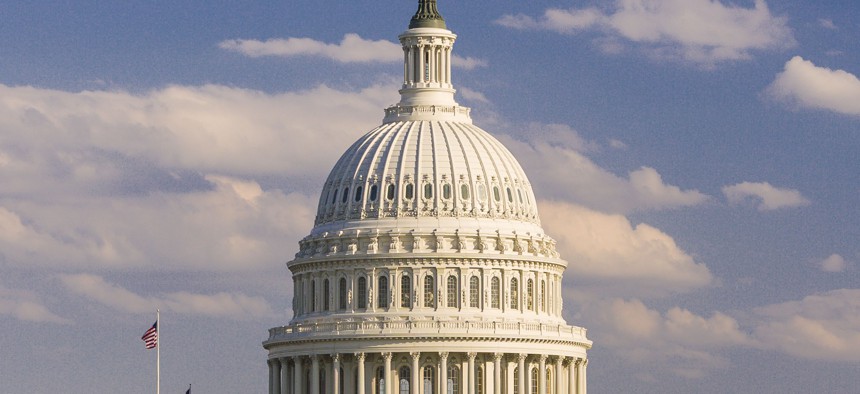As Capitol Hill Debates Health Care, States Face Troubling Fiscal ‘Uncertainty’

Shutterstock

Connecting state and local government leaders
The National Governors Association executive director expressed concerns that changes at the federal level could have onerous effects on already-tight state budgets.
WASHINGTON — The Republican health bill, which seeks to replace the Affordable Care Act with a pared down system based on tax credits along with a plan to “responsibly unwind” Obamacare’s Medicaid expansion has cleared its first major hurdles on Capitol Hill, making it through two House committees on Thursday after grueling sessions.
The U.S. House Energy and Commerce Committee approved the legislation along party lines in a 31 to 23 vote following 27 hours of debate. And the House Ways and Means Committee cleared the bill in the predawn hours.
Both votes took place before the Congressional Budget Office, the nonpartisan agency tasked with conducting nonpartisan analysis for the United States Congress, has been able to determine the cost of implementing the GOP program, or the number of people who would lose their coverage if it were to take effect.
In the midst of this rapidly evolving environment, Scott Pattison, the executive director and CEO of the National Governors Association addressed a room full of health insurance industry experts, policymakers and academics professionals at an event on Thursday as part of America’s Health Insurance Plans’ National Health Policy Conference.
The word of the hour for Pattison was “uncertainty.”
“We’re looking at an extremely uncertain time in so many ways,” he began his remarks.
There is, indeed, a certain measure of uncertainty over how far this iteration of the GOP measure will go.
Matt Salo, executive director of the National Association of Medicaid Directors, told Route Fifty in an interview on Monday that the Republican proposal should be considered in context.
“The bill that was released today is not something that will be enacted into law,” Salo said just hours after the GOP bill was made public. “It is the first step in what will be a very long and very complicated and, often times, very difficult process.”
But, to Pattison, what is even more concerning than the long, unclear road ahead for the GOP bill, is the fact that uncertainty over health care coincides with budgetary uncertainty for many state governments.
Before the Great Recession, state governments, on average, saw about 6 percent year-over-year growth, he noted. But in the time since, growth has yet to return to pre-recession periods. States are experiencing growth again, but the average is only a little over 4 percent.
“So we’re growing,” Pattison said, “but not as fast as we used to.”
Compounding that point is a fact that Pattison “cannot emphasize enough”: That in fiscal year 2017, 29 states adjusted their revenue forecast downward. While Pattinson clarifies that this doesn’t necessary mean a decline in revenue in those states—merely a decrease in the growth rate—it’s still a point of major worry.
And, to Pattison, it’s just another reminder of what he calls the “zero-sum game aspect of states.”
It’s a simple fact that anything done at the federal level, particularly in Medicaid, that involves less money to the states, will put stress on state governments that are already in a difficult situation.
Connecticut is one of those states that finds itself in a tight spot financially, as Route Fifty reported on Thursday. In his budgetary address earlier this month, the state’s governor, Dannel Malloy, voiced deep concerns over potential reductions in federal Medicaid spending, along with other programs:
“While the budget makes modest reductions within the Medicaid program, it does not reflect the potentially disastrous consequences to a successful Medicaid program that could result from federal actions under consideration. The possible repeal of all or significant parts of the Affordable Care Act and proposals to reduce federal Medicaid spending by converting the program to a block grant or imposing per capita caps erode the federal-state partnership and the access to health care for Medicaid beneficiaries. Reductions in federal support will likely force Connecticut to limit services, to drastically cut coverage to thousands, and as a result, could shift health care provision to inappropriate and more costly venues such as hospital emergency rooms, shelters and prisons.”
And, as of now, it seems that Connecticut and states all across the nation may justified in their worry. A Kaiser Family Foundation analysis of a March 2016 House budget resolution—which proposed similar changes to the Medicaid system as those released this week—found that spending caps could mean a $2.1 trillion reduction in federal funding over the 2017-2026 period.
Pattison emphasized that the very nature of what it means to be a state government makes this potential loss of funding particularly challenging. A major priority for states is protection from unforeseen financial risk.
“We don’t do our own interest rates, we aren’t a national government,” Pattison said. “States do not have the ability to go on the markets and do operating deficits like the feds. So if we go into recession, we have less money, period.”
Pattison added that because of the previously mentioned zero-sum budgetary game, “if you’re cutting Medicaid, we will have a lot less money for things like K-12 if we go into any kind of significant financial decline.”
Simply put, “every dollar taken from the state that they can’t somehow adjust for,” Pattison said, “is either a dollar taken from something else or possibly a cut or a tax increase. It really is that tight in many states.”
In this time of uncertainty, however, at least one thing remains abundantly clear to Pattison and governors across the country:
“[Congress] may do what they’re going to do, but we want to make sure states are at the table.”
Quinn Libson is a Staff Correspondent for Government Executive’s Route Fifty based in Washington, D.C.

NEXT STORY: Powerful Wind Storm Leaves Parts of Michigan in the Dark





